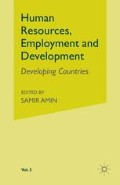Abstract
Owing to their heavy ideological content and obvious political implications, explanations of the nature and causes of unemployment as well as of ‘underdevelopment’ have always induced heated debates among social scientists. Though history gives a rather clear answer to both questions, the influence of false appearance and the conscious or unconscious representation of vested economic or political interests have produced far more mystifying concepts, misleading ideas and sophisticated doctrines in these than in any other fields of economics.
Access this chapter
Tax calculation will be finalised at checkout
Purchases are for personal use only
Preview
Unable to display preview. Download preview PDF.
Notes
See my critique of the conventional theories of ‘underdevelopment’ in T. Szentes, The Political Economy of Underdevelopment (Akademiai, Budapest, 1971, 1973, 1976).
See on this point Samir Amin, L’échange Inegal et la hi de la valeur. La fin d’un débat (Editions Anthropos — IDEP, 1973). p. 89
and also Unequal Development (Harvester Press, Sussex, 1976), pp. 1974, 333.
On these points see, for example, P. P. Streeten, ‘A Critique of Concepts of Employment and Unemployment’, in Richard Jolly, Emanuel de Kadt, Hans Singer and Fiona Wilson (eds), Third World Employment (Penguin Education, 1973) pp. 55–60
and J. Weeks, ‘Does Employment Matter?’, op. cit., pp. 51–5.
For more detailed explanation of this and also some other points see T. Szentes, ‘Structural roots of the employment problem’, UNESCO, International Social Science Journal, XXVIII, No. 4 (1976), 789–807.
See T. Szentes, ‘Migrant Labour System in Black Africa’, ILO Conference on Problems of Employment in Economic Development, International Institute for Labour Studies, Geneva, 12–18 December 1963, CEMP. IZ — reprinted in Indian Journal of Economics, VII, No. 182 (1964), 95–118.
See Ann Seidman, ‘Old Motives, New Methods: Foreign Enterprise in Africa Today’, African Perspectives (Cambridge University Press, 1970).
On this point see also Samir Amin, L’échange inégal… op. cit., pp. 53–65.
See W. Arthur Lewis, ‘Economic Development with Unlimited Supplies of Labour’, in The Economics of Underdevelopment (Asia Publishing House, 1957)
and a critique of its applicability by Richard U. Miller, ‘The Relevance of Surplus Labour Theory to the Urban Labour Markets of Latin America’, International Institute for Labour Studies Bulletin, No. 8 (Geneva, 1971) 220–45
See Giovanni Arrighi, ‘International Corporations, Labour Aristocracies and Economic Development in Tropical Africa’, in G. Arrighi and J. S. Saul, Essays on the Political Economy of Africa (MRP New York, 1973).
For explanation see T. Szentes, ‘How Does the Distorted Socio-Economic Structure Impede the Expansion of Accumulation?’, Studies on Developing Countries, Centre for Afro-Asian Research of the Hungarian Academy for Sciences, No. 54. (Budapest, 1973).
On this topic see, for example, René Dumont, False Start in Africa (Sphere Books, 1966) pp. 73–6, 158, and John Hatch’s contribution, ibid., pp. 235–6.
Author information
Authors and Affiliations
Editor information
Editors and Affiliations
Copyright information
© 1984 International Economic Association
About this chapter
Cite this chapter
Szentes, T. (1984). The Structural Defects of Periphery Economies. In: Amin, S. (eds) Human Resources, Employment and Development Volume 5: Developing Countries. International Economic Association Series. Palgrave Macmillan, London. https://doi.org/10.1007/978-1-349-17461-4_3
Download citation
DOI: https://doi.org/10.1007/978-1-349-17461-4_3
Publisher Name: Palgrave Macmillan, London
Print ISBN: 978-1-349-17463-8
Online ISBN: 978-1-349-17461-4
eBook Packages: Palgrave Economics & Finance CollectionEconomics and Finance (R0)

